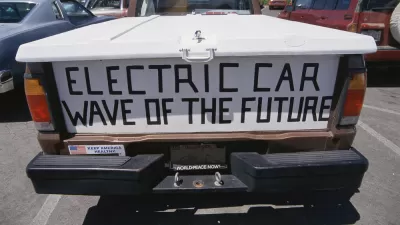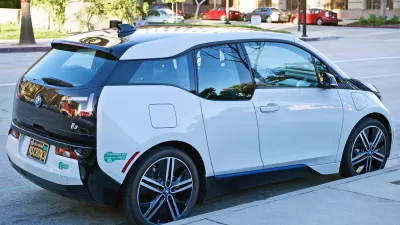A bill working its way through the California State Legislature would require the state to reduce petroleum its consumption by half in 15 years. CALmatters, a nonprofit journalism venture, seeks to find out if it is even possible.
California under Gov. Jerry Brown and its majority Democratic legislature may be more committed to fighting climate change than any other state, and they have legislation to show for it. As posted here in April, SB 350, the Clean Energy and Pollution Reduction Act of 2015 "would (r)educe oil consumption by 50 percent, require renewables to supply 50 percent of electricity generation, and double energy efficiency in existing buildings," all by 2030
Kate Galbraith investigates the possibility of the first goal—halving oil consumption in motor vehicles, for CALmatters, "a nonpartisan, nonprofit journalism venture committed to explaining how California’s state Capitol works and why it matters."
She begins her report at a Stockton fair that promotes electric vehicles (EVs). The event, sponsored by the Charge Ahead initiative, an outcome of SB 1275 that addresses the inherent inequity of the state rebate program by targeting lower income Californians, particularly those with more polluting vehicles.

Credit: Chevrolet 2015 EV Spark
Galbraith speaks with a woman whose 20-year-old Toyota Camry has flunked its smog test. While she's wowed by the all-electric Chevy Spark she test-drove, she chooses to repair the Camry, notwithstanding the generous rebates offered her toward purchase of the Spark.
"If we’re talking about transportation petroleum use, then the goal [to cut use in half by 2030] probably isn’t possible," said John German, a Michigan-based senior fellow with the International Council on Clean Transportation. A key problem, he said, is that people hold onto cars and trucks for a long time, an average of more than 11 years for American cars.
However, that viewpoint is refuted by "Jeffrey Greenblatt, a scientist at the Lawrence Berkeley National Laboratory, [who] estimates that by 2030, a number of transportation policies already in existence will enable the state to cut petroleum use by cars and trucks to about 70 percent of their 2014 level," writes Galbraith. "Besides federal fuel-economy standards, these include support for public transit and a state goal of having 1.5 million emissions-free vehicles by 2025."
In fact, the Charge Ahead initiative enables eligible low income households to "cash in their clunkers and use that voucher with clean car rebates or for car-sharing programs and public transportation," according to Vien Truong, Environmental Equity Director for The Greenlining Institute.
However, "trends are moving in the wrong direction," writes Galbraith. Fuel consumption has been increasing since July 2013. Vehicle miles traveled (VMT) has also been increasing since 2013
So, can technology enable California to meet its oil reduction goal? It can help! In addition to increased electric vehicle sales, "the International Council on Clean Transportation estimates that recent federal fuel-economy standards could cause greenhouse gas emissions from light-duty vehicles nationwide to fall 28 percent by 2030 compared to 2015," writes Galbraith, though that doesn't automatically equate with reduced fuel consumption.
It would be nice to be able to quantify to fuel reduction projected due to:
- Increased EV sales
- Increased fuel efficiency standards
- VMT reduction programs, e.g., public transit
- Low carbon fuel standard, though not mentioned in the article
Notwithstanding Greenblatt's optimistic outlook, it clearly will be difficult for California to cut oil consumption in half, particularly in a time of falling oil prices.
FULL STORY: Can California cut gas use by half in 15 years? Probably not

Maui's Vacation Rental Debate Turns Ugly
Verbal attacks, misinformation campaigns and fistfights plague a high-stakes debate to convert thousands of vacation rentals into long-term housing.

Planetizen Federal Action Tracker
A weekly monitor of how Trump’s orders and actions are impacting planners and planning in America.

San Francisco Suspends Traffic Calming Amidst Record Deaths
Citing “a challenging fiscal landscape,” the city will cease the program on the heels of 42 traffic deaths, including 24 pedestrians.

Defunct Pittsburgh Power Plant to Become Residential Tower
A decommissioned steam heat plant will be redeveloped into almost 100 affordable housing units.

Trump Prompts Restructuring of Transportation Research Board in “Unprecedented Overreach”
The TRB has eliminated more than half of its committees including those focused on climate, equity, and cities.

Amtrak Rolls Out New Orleans to Alabama “Mardi Gras” Train
The new service will operate morning and evening departures between Mobile and New Orleans.
Urban Design for Planners 1: Software Tools
This six-course series explores essential urban design concepts using open source software and equips planners with the tools they need to participate fully in the urban design process.
Planning for Universal Design
Learn the tools for implementing Universal Design in planning regulations.
Heyer Gruel & Associates PA
JM Goldson LLC
Custer County Colorado
City of Camden Redevelopment Agency
City of Astoria
Transportation Research & Education Center (TREC) at Portland State University
Jefferson Parish Government
Camden Redevelopment Agency
City of Claremont




























